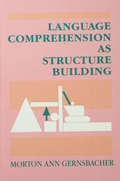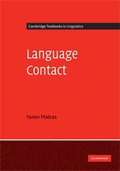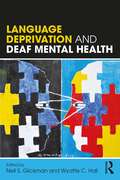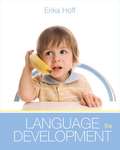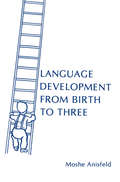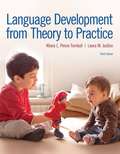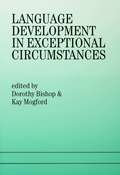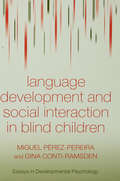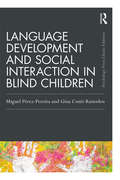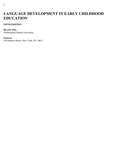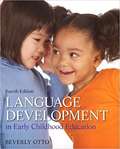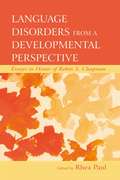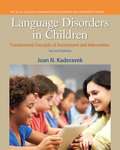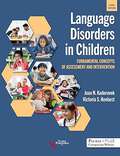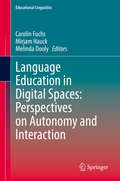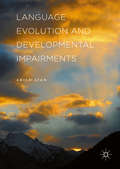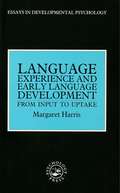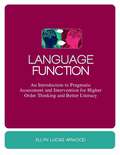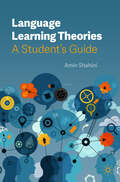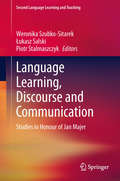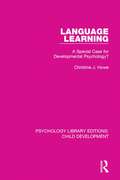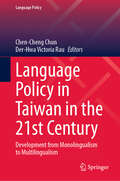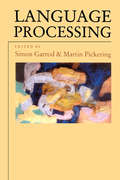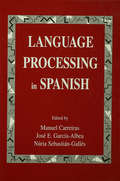- Table View
- List View
Language Comprehension As Structure Building
by Morton Ann GernsbacherThis book presents a new theoretical framework -- what Gernsbacher calls the Structure Building Framework -- for understanding language comprehension in particular, and cognitive processing in general. According to this framework, the goal in comprehending both linguistic and nonlinguistic materials is to build a coherent mental representation or "structure" of the information being comprehended. As such, the underlying processes and mechanisms of structure building are viewed as general, cognitive processes and mechanisms. The strength of the volume lies in its empirical detail: a thorough literature review and solid original data.
Language Contact: The History, Structure and Sociology of a Language
by Yaron MatrasMost societies in today's world are multilingual. 'Language contact' occurs when speakers of different languages interact and their languages influence each other. This book is an introduction to the subject, covering individual and societal multilingualism, the acquisition of two or more languages from birth, second language acquisition in adulthood, language change, linguistic typology, language processing and the structure of the language faculty. It explains the effects of multilingualism on society and language policy, as well as the consequences that long-term bilingualism within communities can have for the structure of languages. Drawing on the author's own first-hand observations of child and adult bilingualism, the book provides a clear analysis of such phenomena as language convergence, grammatical borrowing, and mixed languages.
Language Deprivation and Deaf Mental Health
by Neil S. Glickman Wyatte C. HallLanguage Deprivation and Deaf Mental Health explores the impact of the language deprivation that some deaf individuals experience by not being provided fully accessible language exposure during childhood. Leading experts in Deaf mental health care discuss the implications of language deprivation for a person’s development, communication, cognitive abilities, behavior, and mental health. Beginning with a groundbreaking discussion of language deprivation syndrome, the chapters address the challenges of psychotherapy, interpreting, communication and forensic assessment, language and communication development with language-deprived persons, as well as whether cochlear implantation means deaf children should not receive rich sign language exposure. The book concludes with a discussion of the most effective advocacy strategies to prevent language deprivation. These issues, which draw on both cultural and disability perspectives, are central to the emerging clinical specialty of Deaf mental health.
Language Development
by Erika HoffErika Hoff's LANGUAGE DEVELOPMENT, 5th Edition communicates both the content and the excitement of this quickly evolving field. By presenting a balanced treatment that examines all sides of the issues, Hoff helps readers understand different theoretical points of view-- and the research processes that have lead theorists to their findings. After an overview and history of the field, Hoff thoroughly covers the biological bases of language development and the core topics of phonological, lexical, and syntactic development. She also provides in-depth discussions of the communicative foundations of language, the development of communicative competence, language development in special populations, childhood bilingualism, and language development in the school years.
Language Development From Birth To Three
by Moshe AnisfeldWith selections of philosophers from Plotinus to Bruno, this new anthology provides significant learning support and historical context for the readings along with a wide variety of pedagogical assists.Featuring biographical headnotes, reading introductions, study questions, as well as specialPrologues andPhilosophical Overviews, this anthology offers a unique set of critical thinking promtps to help students understand and appreciate the philosophical concepts under discussion.Philosophical Bridges discuss how the work of earlier thinkers would influence philosophers to come and place major movements in a contemporary context, showing students how the schools of philosophy interrelate and how the various philosophies apply to the world today.In addition to this volume of Medieval Philosophy, a comprehensive survey of the whole of Western philosophical history and other individual volumes for each of the major historical eras are also available for specialized courses.
Language Development From Theory To Practice
by Laura M. Justice Khara L. Pence TurnbullLanguage Development From Theory to Practice provides a survey of key topics in language development, including research methods, theoretical perspectives, and major language milestones from birth to adolescence and beyond, and language diversity and language disorders. <P><P>Each chapter bridges language development theory and practice by providing students with a theoretical and scientific foundation to the study of language development. <P><P>The authors emphasize the relevance of the material to students’ current and future experiences in clinical, educational, and research settings; emphasize multicultural considerations and how they affect language development; focus on using evidence-based practices for making educational and clinical decisions; show the relevance of a multidisciplinary perspective on the theory and practice of language development; and include a number of outstanding pedagogical features to motivate and engage students.
Language Development In Exceptional Circumstances
by Dorothy Bishop Kay MogfordEver since attempts were made to describe and explain normal language development, references to exceptional circumstances have been made. Variations in the conditions under which language is acquired can be regarded as natural experiments, which would not be feasible or ethical under normal circumstances. This can throw light on such questions as: *What language input is necessary for the child to learn language? *What is the relationship between cognition and language? *How independent are different components of language function? *Are there critical periods for language development? *Can we specify necessary and sufficient conditions for language impairment? This book covers a range of exceptional circumstances including: extreme deprivation, twinship, visual and auditory impairments, autism and focal brain damage? Written in a jargon-free style, and including a glossary of linguistic and medical terminology, the book assumes little specialist knowledge. This text is suitable for both students and practitioners in the fields of psycholinguistics, developmental and educational psychology, speech pathology, paediatrics and special education.
Language Development and Social Interaction in Blind Children (Essays in Developmental Psychology)
by Gina Conti-Ramsden Miguel Perez-PereiraThis book provides an up-to-date account of blind children's developing communicative abilities with particular emphasis on social cognition and language acquisition from infancy to early school age. It purports to foster dialogue between those interested in the study of typically developing children and those interested in the development of children who are blind and to provide insights and new explanations of why the development of blind children may differ from that of sighted children. The book also aims to identify and examine current theoretical issues which are likely to be at the centre of developments in the fields of child language and developmental psychology.Language Development and Social Interaction in Blind Children is also a timely book. The study of blind children's development constitutes a unique opportunity to study the effect of vision on development, and more specifically on the development of language and certain aspects of social cognition. Current interest in the development of "theory of mind" and perspective taking in language learning, make the case of blind children crucial to our understanding of certain aspects of psychological functioning. The book explores these issues, challenges some widely-held beliefs about the development of communication in blind children, and provides a cohesive picture of our knowledge to date.
Language Development and Social Interaction in Blind Children (Psychology Press & Routledge Classic Editions)
by Gina Conti-Ramsden Miguel Perez-PereiraThe Classic Edition of this foundational text includes a new preface from Miguel Pérez-Pereira, examining how the field has developed since first publication. The volume provides an in-depth account of blind children's developing communicative abilities, with particular emphasis on social cognition and language acquisition from infancy to early school age. It provides insights into why the development of blind children may differ from that of sighted children and explores development of "theory of mind" and perspective taking in language learning. It also discusses the caregiver–child interaction, research on early intervention and practical strategies for blind children that can assist parents and practitioners. The up-to-date preface discusses recent neurological research and the comparison between the psychological development of visually impaired and autistic children. Language Development and Social Interaction in Blind Children continues to facilitate dialogue between those interested in the study of typically developing children and those interested in the development of children who are blind, and challenges some widely held beliefs about the development of communication in blind children.
Language Development in Early Childhood Education
by Beverly OttoLanguage Development in Early Childhood Education helps future early childhood educators support children's language development from birth through age 8 or 3rd grade. The text presents a compelling, comprehensive view of key linguistic concepts, language development theory, and research while remaining focused on the development of phonological, semantic, syntactic, morphemic, and pragmatic language skills, children’s understanding of written language, and ways in which this acquisition process can be enhanced in early childhood settings. Interesting vignettes of young children's language development open each chapter, and within each chapter anecdotal narratives illustrate key concepts and interaction strategies. Balanced, multidisciplinary, and comprehensive, the approach to language development is ideal for preservice teachers in undergraduate and graduate early childhood education, as well as for continued professional development among inservice teachers. The text has been updated and expanded throughout, and the new Enhanced Pearson eText features links to video clips; alignment among Learning Outcomes, chapter sections, and pop-up multiple-choice quizzes; and a digital Glossary linking key terms to definitions in the eText.
Language Development in Early Childhood Education
by Beverly W. OttoWritten by Beverly Otto, Language Development in Early Childhood Education, 4/e efficiently combines theory, research, and practice to provide a solid foundation for understanding language development in children birth through age eight. A comprehensive resource, it focuses on the development of phonological, semantic, syntactic, morphemic, and pragmatic language skills, children's understanding of written language, and ways in which this acquisition process can be enhanced in early childhood settings. Exact guidance on how to develop classrooms and other learning environments that enhance children's language development is also provided. Every chapter begins with interesting vignettes of young children's language development, and throughout all the chapters, readers will discover anecdotal narratives to illustrate key concepts and interaction strategies.
Language Disorders From a Developmental Perspective: Essays in Honor of Robin S. Chapman (New Directions in Communication Disorders Research)
by Rhea PaulThe last 25 years have witnessed an explosion of research at the intersection of typical language development and child language disorders. A pioneer in bringing these fields of study together is Robin S. Chapman, Emerita, University of Wisconsin. This contributed volume honors her with chapters written by former students and colleagues, who track in their own research the theme of psycholinguistic contributions to our understanding of the nature and remediation of child language disorders. In this volume, such renowned researchers in child language development as Dorothy Bishop, Judith Johnston, and Ray Kent, among others, discuss their research in certain populations in the context of the significance of, limits of, and alternatives to Robin Chapman’s developmental interactionist perspective. Studies of disordered language in Down’s Syndrome and Specific Language Impairment, in particular, attribute much progress in our understanding of the pragmatic and comprehension skills in these populations to the developmental perspective. Language Disorders From a Developmental Perspective opens with a reprint of Robin Chapman’s seminal 2001 article from The Journal of Child Psychiatry and Psychology. It concludes with a new chapter from Dr. Chapman summarizing what we know and what we don’t know about language disorders within the developmental framework, and pointing to future areas of research and intervention. Clinicians as well as scholars will benefit from this book, as will students in programs of developmental psycholinguistics, child language disorders, and learning disabilities.
Language Disorders in Children: Fundamental Concepts of Assessment and Intervention
by Joan N. KaderavekThis text is more than an introductory look at language disorders. It goes beyond basic concepts and basic definitions to teach students how to analyze, synthesize, evaluate, and link the information they are learning. It offers readers opportunities for higher-order learning, while preparing students to become careful evaluators of information, as well as adept problem solvers. Organized by disorder groups and theme, Language Disorders in Children, 2/e helps students easily make connections between theoretical information and clinical practice through a number of thoughtful features such as case histories, clinical decision trees, and hot topic discussions. It's an approach that meets the needs of today's students to learn lifetime critical thinking skills, to see relationships between isolated ideas and facts, and to think like a speech-language pathologist.
Language Disorders in Children: Fundamental Concepts of Assessment and Intervention
by Joan N. Kaderavek Victoria S. HenbestNow published by Plural, this modernized third edition of Language Disorders in Children: Fundamental Concepts of Assessment and Intervention offers a comprehensive overview of language disorders in children for speech-language pathology students. <P><P>The expert authors bring together decades of clinical experience and pedagogical expertise to create a comprehensive resource with instructional strategies and clinical applications, enhanced with numerous activities, discussions, and case studies that promote critical thinking. <P><P>This edition introduces a groundbreaking model that utilizes a story-based approach to explain the dimensions of choosing and developing interventions. This method engages students in a thought experiment that illuminates the nuances of clinical decision-making, particularly for children with developmental language disorder, autism, and other developmental disabilities. The book revisits and expands upon the well-regarded five communication subdomains framework, providing a clear and structured approach to understanding language development from early pragmatic skills to advanced discourse.
Language Education in Digital Spaces: Perspectives on Autonomy and Interaction (Educational Linguistics #52)
by Carolin Fuchs Mirjam Hauck Melinda DoolyThis book brings together contributions on learner autonomy from a myriad of contexts to advance our understanding of what autonomous language learning looks like with digital tools, and how this understanding is shaped by and can shape different socio-institutional, curricular, and instructional support. To this end, the individual contributions in the book highlight practice-oriented, empirically-based research on technology-mediated learner autonomy and its pedagogical implications. They address how technology can support learner autonomy as process by leveraging the affordances available in social media, virtual exchange, self-access, or learning in the wild (Hutchins, 1995). The rapid evolution and adoption of technology in all aspects of our lives has pushed issues related to learner and teacher autonomy centre stage in the language education landscape. This book tackles emergent challenges from different perspectives and diverse learning ecologies with a focus on social and educational (in)equality. Specifically, to this effect, the chapters consider digital affordances of virtual exchange, gaming, and apps in technology-mediated language learning and teaching ranging from instructed and semi-instructed to self-instructed contexts. The volume foregrounds the concepts of critical digital literacy and social justice in relation to language learner and teacher autonomy and illustrates how this approach may contribute to institutional objectives for equality, diversity and inclusion in higher education around the world and will be useful for researchers and teachers alike.
Language Evolution and Developmental Impairments
by Arild LianThis book gives an account of developmental language impairment from the perspective of language evolution. Components of language acquisition and specific language impairments can be mapped to stages in the evolutionary trajectory of language. Lian argues that the learning of procedural skills by early ancestors has served as pre-adaptation of grammar. The evolutionary perspective gives rise to a re-evaluation of developmental impairment with respect to diagnostic terminology and methods of treatment. Chapters within cover topics such as dyslexia, the cultural mediation of language evolution and the cross-modality of language. Turn-taking in marmoset monkeys is considered as a pre-adaptation to dialogue in humans, and the role of infant-caregiver interactions is discussed. Language Evolution and Developmental Impairments will be of interest to linguists, psychologists and neurobiologists interested in the intersection of these subjects, as well as scholars of language acquisition and language impairment.
Language Experience and Early Language Development: From Input to Uptake (Essays in Developmental Psychology)
by Margaret HarrisAddresses one debate in language development, namely the relationship between children's language development and their language experience.
Language Function
by Ellyn Lucas ArwoodLiteracy teaching tends to take a structural approach to language, focusing on auditory products or skills such as sounds, morphemes, words, sentences, and vocabulary. However, new research suggests that the majority of English speakers actually think and learn in visual concepts, and that there is a cultural and linguistic mismatch between auditory teaching methods and the way students think and learn. This has important implications for all educators including those who work with students with neurogenic disabilities, such as autism spectrum disorders and ADHD. In her new book, Dr. Ellyn Lucas Arwood outlines a revolutionary four-tiered model of how a learner acquires language, and suggests ways to impose visual language functions onto an auditory language like English in order to improve learning for both neurotypical learners and those with neurogenic disabilities. Dr. Arwood provides tried-and-tested intervention strategies that work with all levels of ability, giving readers the knowledge and confidence to teach learners to become more literate in a way that raises learners' abilities to think and problem solve. This book takes a fresh look at how language and literacy interact, and will be of interest to educators and special educators, speech and language pathologists, and other professionals who support language learning and development.
Language Learning Theories: A Student’s Guide
by Amin ShahiniThis book demystifies language learning theories and offers clear explanations, interactive exercises, and summary tables to help students connect theory with practice. It explores key frameworks such as Behaviorism, Innatism, and Constructivism, as well as modern perspectives like Chaos-Complexity Theory. Through an engaging structure, each chapter unpacks fundamental theories, debates, and real-world applications and highlights critical topics like learner diversity, automaticity, and sociocultural influences. The book also examines the impact of language learning theories on teaching strategies, classroom materials, and curriculum design. Practical examples, in-class activities, and digital resources—including YouTube references—enhance understanding and encourage active learning. Designed for undergraduate, graduate, and even postgraduate students, this essential guide balances academic rigour with accessibility, making it a valuable resource for those studying second language acquisition, applied linguistics, and language teaching. Whether new to the field or a specialist, readers will gain the tools to critically engage with research and classroom methodologies.
Language Learning and the Brain: Lexical Processing in Second Language Acquisition
by Ulf SchützeEvery person who encounters or learns another language is faced with the challenge of processing many new words in a short period of time. What are the conditions under which a learner can acquire those words successfully and process them to long-term memory? How do language and memory faculties interact? What role do the senses play in this process? Are factors such as age or individual backgrounds of learners to be considered? Taking the reader on a fascinating journey through the brain to demonstrate how language is processed, Ulf Schütze explains the dynamic environment involved in recording and producing words. The book also discusses how to use information technology, such as Apps, to make the learning of words entertaining and efficient. Describes learning words in another language as a dynamic and fluid process. Provides a strong research base in second language acquisition, psycholinguistics, cognitive psychology, and neurophysiology. Outlines practical applications that are helpful for learners, teachers, researchers, and the general public.
Language Learning, Discourse and Communication
by Weronika Szubko-Sitarek Łukasz Salski Piotr StalmaszczykThis volume brings together papers on a wide spectrum of topics within the broad area of language acquisition, stressing the interconnections between applied and theoretical linguistics, as well as language research methodology. These contributions in honor of Professor Jan Majer have been grouped in two sections: language learning, and discourse and communication. The former discusses issues varying from aspects of first, second, and third language acquisition, individual learner differences (i. e. gender, attitudes, learning strategies), and second language research methodology to the analysis of features of learner spoken language, the role of feedback in foreign language instruction, and the position of culture in EFL textbooks. The second part of the volume offers a theoretical counterbalance to the applied nature of the first one. Here, the contributions touch upon spoken and written language analysis, language awareness, and aspects of the English language; also, selected issues of language philosophy are discussed. The wide range of topics covered in the publication, authored by specialists in their respective areas, reflects Professor Majer's academic interests and corresponds to the complex nature of the general field the volume aims to portray.
Language Learning: A Special Case for Developmental Psychology? (Psychology Library Editions: Child Development #3)
by Christine J. HoweOriginally published in 1993, the starting place for this book is the notion, current in the literature for around 30 years at that time, that children could not learn their native language without substantial innate knowledge of its grammatical structure. It is argued that the notion is as problematic for contemporary theories of development as it was for theories of the past. Accepting this, the book attempts an in-depth study of the notions credibility. Central to the book’s argument is the conclusion that the innateness hypothesis runs into two major problems. Firstly, its proponents are too ready to treat children as embryonic linguists, concerned with the representation of sentences as an end in itself. A more realistic approach would be to regard children as communication engineers, storing sentences to optimize the production and retrieval of meaning. Secondly, even when the communication analogy is adopted, it is glibly assumed that the meanings children impute will be the ones adults intend. One of the book’s major contentions is that a careful reading of contemporary research suggests that the meanings may differ considerably. Identifying such problems, the book considers how development should proceed, given learning along communication lines and a more plausible analysis of meaning. It makes detailed predictions about what would be anticipated given no innate knowledge of grammar. Focusing on English but giving full acknowledgement to cross-linguistic research, it concludes that the predictions are consistent with both the known timescale of learning and the established facts about children’s knowledge. Thus the book aspires to a serious challenge to the innateness hypothesis via, as its final chapter will argue, a model which is much more reassuring to psychological theory.
Language Policy in Taiwan in the 21st Century: Development from Monolingualism to Multilingualism (Language Policy #38)
by Der-Hwa Victoria Rau Chen-Cheng ChunThis book provides insiders' views of how Taiwan's monolingual language policy has evolved into multilingual language policies since its peaceful transition to a democratic society in the late 20th century. From three major perspectives, it examines the conflicts and compromises of monolingual and multilingual ideologies, challenges and approaches in language management, and actual language practice in families and communities in the transformation process in the last three decades. The book intends to theorize Taiwan's multilingual experience and introduce it to the international scholarly community, who are more familiar with the monolingual development on the other side of the Taiwan Strait and less aware of the multilingual development in Taiwan. It is an eye-opening book for language planning and policy students, language educators, public policymakers, and all those with a stake in multilingualism.
Language Processing (Studies in Cognition)
by Simon Garrod Martin J. PickeringLanguage Processing questions what happens when we process language - what mental operations occur during processing and how they are organised over time. The last decade has seen real advances in the study of language processing that have wide ranging implications for human cognition in general. Language Processing gives an account of these developments both as they relate to experimental studies of processing and as they relate to computational modelling of the processes. In addition to chapters covering core topics, such as lexical processing, syntactic parsing and the comprehension of discourse, special topics of recent interest are also included.
Language Processing in Spanish
by José Manuel Carreiras NúriaThis book presents a set of contributions to the current flow of psycholinguistic research, with new and challenging data gathered from Spanish that may illuminate issues about the generality of language processing models. Although it is possible to find a considerable amount of papers on psycholinguistic research with the Spanish language published in English-speaking journals, unfortunately, the scientific community does not have access to an overview of psycholinguistics in Spain. This book overcomes these limitations because it brings together state-of-the-art descriptions of the research and theory of the different subareas of psycholinguistics currently being studied in Spain. Spanish, the third most widely-used language in the world, differs from English in a number of important respects. Since English has been predominant in psycholinguistic research, contrasting properties of Spanish may help to test the generality of language processing mechanisms and to refine their description. The set of contrasting features considered in this book includes acoustical and syllabic transparency, shallow orthography, a much richer morphology, flexibility in word order, less variability in intonational contours, and the existence of null pronominal subjects for inflected verbs. There are also interesting contrasts in the frequency of different linguistic units, whose impact on language processing is also evaluated. One of the main lines of argument throughout this book deals with the tension between universality and variation as a way of characterizing the functioning of language capacities and processes. The variety of topics covered by this book ranges from one end of the spectrum of language related behavior to the other: speech perception, lexical access in word recognition, relations between phonological and orthographic representations, sentence processing, discourse comprehension, and language production. All chapters focus on questions of general interest within each topic, and in most cases they appeal to one particular feature of the Spanish language that is relevant for a given question. Most chapters show the indisputable importance of crosslinguistic research in psycholinguistics to improve understanding on whether universal cognitive mechanisms and language specific routines underlie the ability of understanding and producing language.
